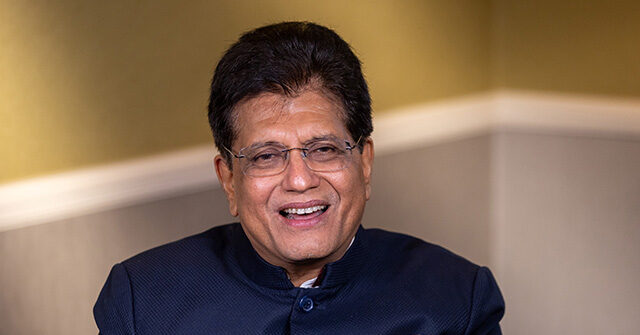The headlines have lately been filled with stories of rising tension between the U.S. and India, sparked by President Donald Trump’s tariffs and his insistence on India cutting back its purchases of Russian oil, but Indian Commerce Minister Piyush Goyal was upbeat on Tuesday about the prospects of signing a trade deal by November.
Goyal told an investor conference in Mumbai that all of India’s trade negotiations are going well, including “very active and significant progress” on a free trade agreement with the European Union. He said other agreements with nations like Oman, Chile, and Peru were in an “advanced stage.”
“I do hope that things will get back on track soon and we will conclude a bilateral trade agreement by autumn, November or so, as was discussed by our two leaders in February,” he said. Indian Prime Minister Narendra Modi met with Trump at the White House on February 13.
At another industry event on Tuesday, Goyal said India is currently in a “dialogue with the U.S.” to sign a bilateral trade agreement (BTA).
“We recognise that there is tremendous global turbulence and we are living in volatile, uncertain times, full of trepidations about the future,” he said, adding that such volatility would also bring opportunities.
Goyal also highlighted India’s reset of relations with neighbor and rival China, culminating in Modi’s VIP treatment at this week’s Shanghai Cooperation Organization (SCO) meeting in China.
“We had a problem in Galwan, due to which we had a blip in the relationship. As the border gets resolved, I think the situation getting back to normal is a very natural consequence,” he said.
Galwan Valley is the Himalayan border region where Indian and Chinese troops fought vicious hand-to-hand battles in 2020. At least 20 Indian soldiers died in one of those scuffles.
Modi’s trip to the SCO conference looked to many analysts like a signal that India was moving into China and Russia’s orbit, driven away from its decade-long shift to the West by its trade dispute with Trump.
Chinese dictator Xi Jinping and Russian President Vladimir Putin strove to give the impression that India was signing on to a post-American alliance of “Global South” nations that would “take a clear stand against hegemonism and power politics.”
Modi was careful to avoid doing or saying anything that would decisively slam the door in America’s face, although he seemed happy to remind Trump that India has other partners and other markets it can pursue.
Trump’s trade adviser, Peter Navarro, was nevertheless sharply critical of Modi’s trip to China, in comments made only a few hours before Goyal’s speech to the development conference in Mumbai.
“It was a shame to see Modi getting in bed as the leader of the biggest democracy in the world with the two biggest authoritarian dictators in the world: Putin and Xi Jinping. That doesn’t make any sense,” Navarro said.
“I’m not sure what he is thinking, particularly since India has been in a cold war and sometimes a hot war with China for decades,” Navarro mused.
“So we hope that the Indian leader comes around to seeing that he needs to be with us and Europe and Ukraine and not with Russia on this and he needs to stop buying the oil,” he concluded.
Treasury Secretary Scott Bessent was more gently critical of Modi on Tuesday, dismissing China’s SCO summit as “largely performative” and sharing Goyal’s optimism about India and the U.S. eventually working out a trade deal.
“I think at the end of the day, India is the most populous democracy in the world. Their values are much closer to ours and to China’s than to Russia’s,” Bessent said.
“I think at the end of the day, two great countries will get this solved. But the Indians have not been great actors in terms of buying Russian oil and then reselling it, financing the Russian war effort in Ukraine,” he said.
President Trump left the door open for a deal on Tuesday, criticizing India as “the most tariffed nation” in the world during a radio interview on Tuesday, but claiming India has offered the U.S. a “no-tariff deal” to correct the imbalance. Trump has said several times this week that India offered to eliminate its tariffs on American exports to seal a deal.
Read the full article here


